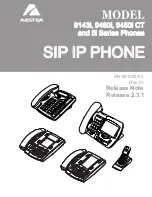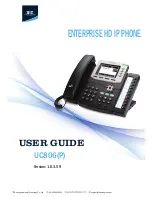
ZF303450 Rev A
B. Central Station Operation
After the “
HELP
” / “
CALL
” button on the
1600A
Series phone has been pressed the
1600A
Series phone will begin to dial. If a voice
number is programmed in memory locations
#00-#04
, these numbers will be dialed first. Upon detecting a busy signal or after a
preprogrammed ring delay the
1600A
Series phone will hang-up and dial the central station phone number stored in memory loca-
tion
#05
. When the central station receiver answers, it will send a handshake tone to the
1600A
phone. Upon detecting the hand-
shake tone, the
1600A
Series phone will begin uploading the information stored in memory location
#20
.
Once the
1600A
Series emergency phone has sent the information stored in memory location
#20
, it waits for a “kiss-off” tone from
the central station. When the “kiss-off” tone is received, the emergency phone turns on the call connected LED and goes into the
“two-way talk mode” or hangs up and dials position
#06
if programmed (see Note 3 below).
Notes:
1.
The central station should have a “talk-over” feature that will allow a two-way conversation at this time. If your receiver does not
support “talk-over”, a voice phone number should be programmed into position
#06
.
2.
If the central station answers the call, sends the handshake tone, but does not send a “kiss off” tone after the information is sent,
the
1600A
resends the information three additional times, waiting for a “kiss-off” after each attempt. If “kiss-off” has not been received
after the fourth attempt, the
1600A
hangs up and dials position
#05
again.
3.
The
1600A
has the capability to send a second informational message to the receiver after the first “kiss-off” is received, but only
if a second informational message is stored in memory location
#21
. After the first “kiss-off” is received, the
1600A
sends the infor-
mation stored in memory location
#21
. It then waits for a second “kiss-off” from the central station receiver. When the second “kiss-
off” is received, the emergency phone turns on the call connected LED and goes into the “two-way talk mode” or hangs up and dials
position
#06
if programmed.
Due to the dynamic nature of the product design, the information contained in this document is subject to change without notice. Viking Electronics, and its affiliates and/or subsidiaries
assume no responsibility for errors and omissions contained in this information. Revisions of this document or new editions of it may be issued to incorporate such changes.
DOD# 215
Printed in the U.S.A.
P
P
r
r
o
o
d
d
u
u
c
c
t
t
S
S
u
u
p
p
p
p
o
o
r
r
t
t
L
L
i
i
n
n
e
e
.
.
.
.
.
.
7
7
1
1
5
5
.
.
3
3
8
8
6
6
.
.
8
8
6
6
6
6
6
6
F
F
a
a
x
x
B
B
a
a
c
c
k
k
L
L
i
i
n
n
e
e
.
.
.
.
.
.
7
7
1
1
5
5
.
.
3
3
8
8
6
6
.
.
4
4
3
3
4
4
5
5
12
A. Standard Operation
1. “HELP” / “CALL” Button
When the “
HELP
” / “
CALL
” button is pressed, the
1600A
series phone goes off-hook and dials a pre-programmed telephone
number. The Call Connected LED momentarily flashes during tone or pulse dialing. In the event the line is busy or there is a
ring-no-answer, the unit can be programmed to call additional phone numbers.
The phone then cycles through up to 5 pre-programmed emergency numbers until the call is answered. When the call is
answered, the digital voice announcer will automatically play to identify the location of the emergency call. The phones are fac-
tory programmed to play the announcement once, and then automatically light the “Call Connected” LED to show that hands-
free communication to emergency personnel is established. The * key will send the I.D. number (if programmed), and play the
announcement again. The distant party will know the location of the emergency call by either the voice announcement or by
decoding the Touch Tone I.D. number. Once the “Call Connected” LED is on, the # key can be used to force the phone to hang-
up.
O
O
p
p
e
e
r
r
a
a
t
t
i
i
o
o
n
n
2. “INFO” Button (E-1600-20A and E-1600-52A Only)
When the “
INFO
” button is pressed (
E-1600-20A
and
E-1600-52A
only), the phone goes off-hook and dials the first “
INFO
”
phone number programmed. If a busy signal is detected or the call goes unanswered, the phone will cycle through all three
“
INFO
” phone numbers until the call is answered. When answered, handsfree communication is established.
Note:
The voice
announcement is for
Emergency/Help
calls only and will not play on a call initiated from the “
INFO
” button.
d. 4+2 Express Format
This DTMF format consists of a four digit account code, two digit message type, and a two digit event code.
Account Code
Message Type
XXXX 27 XX #20
Memory Location
Event Code
Enter 4+2 Express ID Settings Here:
27
#20






























